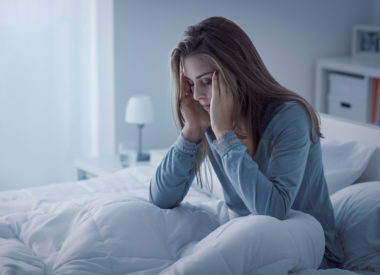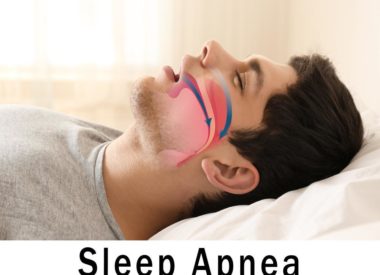Lack of Sleep and Mood Disorders: A Connection
As we sleep, we process emotional information and experiences so that they, in turn, become memories.
When we don’t get enough sleep, we shortchange ourselves this process, leading to the likelihood we will encounter emotional problems as a result.
A connection between mood disorders and sleep deprivation should not be altogether surprising.
Anyone who has had even one bad night of sleep can vouch for the day-after irritability, emotional reactivity, and increased stress that lack of sleep can bring.
But over the long haul, sleep deprivation has been shown to heighten our risks for developing full-blown mood disorders.
People who have problems with sleep are at increased risk for developing emotional disorders, depression, and anxiety, says Dr. Lawrence J. Epstein, Medical Director of Sleep Health Centers and an instructor at Harvard Medical School.
Lets take a closer look at the link between mood disorders and sleep deprivation.
What are mood disorders?
A mood disorder is not the same as a bad mood. A bad mood is a temporary situation, whereas a mood disorder is a condition which influences ones emotional state every single day.
The term mood disorder refers to three mental health conditions: major depressive disorder, dysthymic disorder, and bipolar disorder (commonly referred to as manic depression).
When any of these conditions is left untreated, this increases the risk for developing chronic medical problems like heart disease and diabetes.
Fortunately, mood disorders are treatable with medications, therapy, or a combination of the two. However, the challenge lies in detecting these conditions, getting an accurate diagnosis, and finding the right treatment.
Mood disorder statistics
-
According to data compiled by the US National Library of Medicine and the Archives of General Psychiatry, 10 percent of American adults are mood disordered.
-
At some point in their lives, its estimated that nearly a quarter of women and 15 percent of men will experience at least one episode of major depression.
-
Almost 6 million US adults suffer from bipolar disorder, with the condition affecting men and women equally.
-
The median age of onset for mood disorders is age 30.
What is sleep deprivation?
Sleep deprivation is the result of not getting enough adequate during the night in order to maintain good health.
How much sleep you need depends on your age, but take heed: the Centers for Disease Control, in 2015, declared sleep deprivation Americas number one public health epidemic.
Sleep deprivation could be due to any number of causes:
-
undetected or untreated sleep disorders (especially insomnia, delayed sleep phase syndrome, and obstructive sleep apnea )
-
medical conditions
-
mental health issues
-
the use (or misuse) of medications
-
poor sleep hygiene
-
the voluntary restriction of sleep
Howare mood disorders and sleep deprivation connected?
Mood disorders affect nearly half of all patients with chronic sleep problems, with insomnia considered one of the biggest causes of sleep deprivation being the most common complaint.
When sleep deprivation remains unaddressed, the development of mood problems escalates, leading to a self perpetuating problem, in which poor mood leads to agitation, anxiety, and arousal triggered by stress which then makes it even harder to fall asleep and stay asleep.
Sleep deprivation caused specifically by fragmented sleep has also been shown to have a far more negative impact on mood than sleep deprivation caused by not getting enough hours of continuous sleep.
According to research from the National Institutes of Health released in 2015 and published in SLEEP, interrupted sleep is suspected to reduce slow-wave (deep) sleep, leading to poor mood, lower energy levels and other negative emotional outcomes.
Research by Benca published inSleep Medicine Reviews nearly 20 years ago found that depressed patients may have abnormalities in sleep continuity, REM sleep, and slow-wave sleep.
Ten years later, another study led by Benca further discovered sleep problems to be the chief complaint among those suffering with acute mood disorders.
These patients generally registered higher rates of sleep loss than the general population, even when they we not experiencing periods of mood swings.
They were also at higher risk for developing insomnia or hypersomnia. Finally, Benca found evidence of measurable differences in sleep patterns for those who were mood disordered, suggesting a neurological connection between mood and sleep.
Flash forward to February of 2016: laboratory research from the Howard Hughes Medical Institute revealed the discovery of a gene which may serve as a go-between between mood and circadian rhythms.
Study author Louis Ptek, MD stated that We thinkPER3[the gene under investigation] is a connection between pathways related to mood and the biological clock.
While they still don’t know how the gene interacts with mood and circadian rhythms, the discovery verified Benca’s earlier suspicions and now may help direct much needed treatment research for mood disorders.
Sleep deprivation and suicide
Mood disorders may present with the following symptoms:
-
intense melancholy
-
feeling hopeless
-
lethargy or malaise
-
loss of appetite
-
sleep disruption
-
reduced performance of activities of daily living
-
loss of interest in once-pleasurable pursuits
For some, the emotional toll of these symptoms compels them to entertain suicidal thoughts. One of the worst times to do this is at night, precisely when stress, anxiety, and agitation are heightened by an already disrupted pattern of sleep, often presenting as insomnia.
In 2013, studies conducted at George Regents Medical Center found a connection between suicidal thoughts and the presence of negative attitudes and beliefs about sleep in depressive patients which led to insomnia.
Two groups in this study also showed specifically higher risk for suicidal thoughts than the general population as the direct result of sleep disruption caused by insomnia: young adults and the elderly.The presence and severity of insomnia was also directly associated by degree with the experience of suicidal ideation.
Prioritizing sleep
Losing sleep has been shown to increase the risk for developing mood disorders.
Suffering from mood disorders has been shown to lead to the further disruption of sleep.
Perhaps the best approach to avoiding either problem is to make adequate sleep a top priority.
If this seems impossible, a trip to your primary care physician is in order. You cannot allow one or the other to continue untreated without suffering serious consequences.
For those who already have a diagnosed sleep disorder, its treatment is critical to prevent sleep deprivation. And for those who already have a diagnosed mood disorder, its treatment is equally critical to prevent sleep deprivation.
If your treatment isn’t working, don’t give up. See your doctor about alternatives so you can avoid the dangers and consequences of sleep deprivation.
Sources:
American Academy of Sleep Medicine
Archives of General Psychiatry
Centers for Disease Control
Depression and Bipolar Support Alliance
George Regents Medical Center
Healthy Sleep/Harvard Medical School
Howard Hughes Medical Institute
National Institutes of Health
The Psychiatric Clinics of North America
Psychology Today
SLEEP
Sleep Medicine Reviews
US National Library of Medicine



